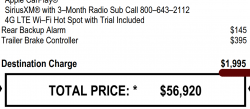— Another Chrysler destination/delivery charge class action lawsuit has been dismissed after the New Jersey judge referenced previous dismissals against FCA and other automakers.
According to the lawsuit, Fiat Chrysler (FCA) makes a profit from the destination charge dealers place onto buyers of new vehicles.
The class action lawsuit alleges customers don't know FCA makes a profit from the charges.
The destination charge appears clearly on the window sticker (Monroney label) of each new car.
The plaintiffs who sued assert they should not have been charged the fees because the charges are allegedly not the real cost for delivering a new vehicle to the dealer.
Lawyers across the country began filing destination charge lawsuits following a report which said automakers have increased destination fees from an average of $840 in 2011 to $1,240 in 2020.
The lawsuit alleges owners are deceived by the charges, and the plaintiffs claim they wouldn't have purchased their vehicles if Chrysler would have told them there was a profit for FCA in the charge.
The Automobile Information Disclosure Act requires automakers to disclose on the Monroney label, “the amount charged to the dealer for the transportation of the car to the place of delivery.”
But according to the lawsuit:
"By virtue of the name of the fee itself, Defendants mislead reasonable consumers into believing its “Destination Charge” reflects the actual cost of shipping vehicles to their “destination,” not the cost of shipping the vehicle plus profit." — Chrysler class action lawsuit
Chrysler Destination Charge Lawsuit Dismissed
The judge dismissed the class action by referencing decisions from the Ninth Circuit and other federal courts which said the customers failed to adequately state a claim.
According to the judge, FCA didn't leave out material information when posting the destination charges on the window stickers.
The judge cited the Ninth Circuit’s decision in Romoff v. General Motors and other court decisions including Beeney v. FCA.
The court in Beeney ruled the word “charge” is not a “specialized term that requires sophistication or expert knowledge.” In addition, the judge said, “consumers every day undoubtedly pay a host of charges and fees with the understanding that sellers price goods and services to make a profit.”
And in the Beeney case, the judge found "there is no allegation that the amount of any destination charge was more than what the manufacturer charged to the dealerships. Thus, using the term 'destination charge' to refer to the amount FCA charged the dealers is not deceptive or unfair."
The Chrysler destination charge class action lawsuit was filed in the U.S. District Court for the District of New Jersey: Enright, et al., v. FCA US LLC, et al.
The plaintiffs are represented by Kopelowitz Ostrow Ferguson Weiselberg Gilbert, and Kaliel Gold PLLC.

